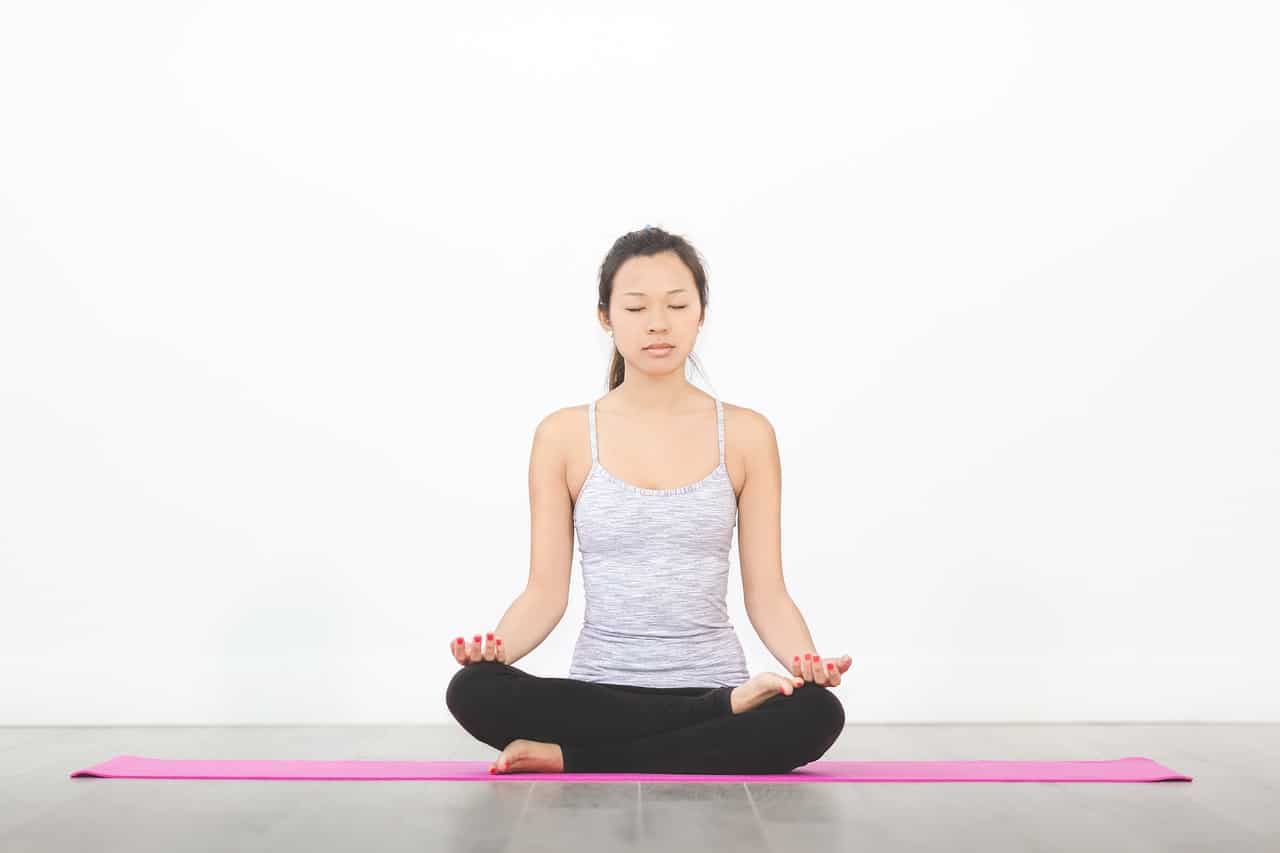
How to deal with stress at work.
Stress is terrible. It messes up your brain, creates anxiety, can take away your self-control, and even make you sick. And quite a lot of our stress can come from our work environment. You might have a perfect job and boss, but still encounter stress a work. And it’s a fact that the more stressed you are a work, the more your performance can suffer. And the more that happens, the more stress it creates. Such a viscous cycle! So here are seven stress management techniques you can use to reduce your levels of stress at work.

1. Take time to breathe
When work starts to get overwhelming, stop and take ten seconds to notice what you’re feeling. Then, just breathe. It’s a good idea to breathe deeply 5-10 times at day at work. Try to make this a habit, or pair it up with other reminders, like standing every 30 minutes or so.
Tips to help schedule your breathing breaks
There are all kinds of apps you can use for this, but I simply use a calendar entry every day in my Outlook calendar and set it to remind me every 30 minutes. Once reminded, I stand or breathe deeply (or both) and then set my reminder to snooze for another 30 minutes.
When you take deep breaths, try to breathe in deeply, hold the breath for a few seconds, and then exhale slowly. And use your belly, not your chest. You should feel a feeling of peace and calm when you breathe deeply. It’s a good idea to do this throughout the day. And remember, practice makes perfect!

2. Exercise. Or at least stretch a little
You’d be surprised how much exercise helps your body. It releases natural chemicals which have a relaxing effect to the body. Try a simple workout regimen to start moving and get blood flowing through your body.
A simple routine
Below is a simple routing you can do at your desk to stretch and relax.
- Stand up in front of your desk chair. Hold onto the back of the chair and close your eyes. Take a deep breath and relax tense areas in your body. Now just listen. You’re not listening for anything in particular, just listen and don’t think. This helps calm your mind.
- Now roll your head in a circle. Left to right or right to left.
- Now tilt your head to the left, as if you are trying to touch your left shoulder with your left ear. So this slowly and if you feel any discomfort, stop.
- Now repeat step 3 but with your head tilting to the right.
- Bend your knees and do a short squat towards the floor. Keep holding onto the back of your chair for balance. Breathe deeply as you do this.
- Now stand back up and repeat step one. This time though, take 3 very deep breaths from your belly as you relax.

Get some any way you can
In general, you should try to get some exercise every day. At least 30 minutes of exercise a day is considered a good thing. But if you’re working on a tight schedule at least try to get in as much exercise as you can, when you can. For example, take the stairs instead of the elevator, or try power walking during your lunch break.

3. Listen to music
You can listen to music that is relaxing to reduce stress even further. Relaxing music releases chemicals within the brain to take the edge of stress off your mind.
Whistle while you work
If you’re working from home, it’s pretty easy to turn on some relaxing tunes. If you’re in the office, maybe not so much. But you can still use headphones to listen to music from your phone or other device.
Here’s a trick I use. I go to YouTube and search for relaxing music or meditation music and find a long track of calming sounds that I can listen to. I just restart it again when it’s finished. I also try to make the music ending my reminder to breathe deeply or stand up and exercise.
Of course, you can also try listening to relaxing music when you’re in the car driving home from the office to decompress after a long day.

4. Get a change of scenery
Try changing your environment around you. For example, if you work in a cubicle but spend your lunch break in the park, you’ll feel very differently than if you worked in the office all day. Get away from the computer screen and do something else to change your environment. Get up and get out and away from your desk multiple times a day if you can.
Break up the stress
Take breaks when you need to take a break. You don’t have to work from 9 am to 5 pm every day, especially if you have a day job. Set boundaries on how much time you work in the day, and make sure you give yourself at least one hour of downtime. This will let your mind and body relax and leave space for you to get tasks done.
Work from home? Yes Please!
Speaking of changing the scenery, there’s a lot to be said about working from home. And there are a lot of benefits. But here’s one you might not know: Your state of mind while you work from home can play a big part in how productive you are.
That’s because there’s a big difference in the way you feel when you’re in your office and when you’re at home. So, it can be a beneficial way to treat yourself and give yourself a break and not feel like you have to work.
And having your own space can be good for your mental health. It helps you to relax more because there’s no one watching you and making you self-conscious. So if it’s possible, see if your work will allow you to work remotely from home, either just a few days a week or the entire work week.

5. Keep track of your work stress by journaling
Journaling is a proven way to identify what might be causing your stress. This can help you get closer to learning how best to deal with your feelings and emotions that can often times be a root cause of your work stress.
There’s nothing like a good notebook
With journaling, you keep a notebook nearby and then you simply record a stressful situation during or right after it takes place. Then you think about why you’re feeling the way you do. What is making you feel this way?
When you record your stressful situations, and this forces you to think about how you can apply different strategies to those situations. For example, you might ask yourself if you’re being reactive. If that’s the case, then tell yourself to be proactive instead. There are many things that can be done when you are in such a situation. You can make one phone call less. You only have to complete half the task instead. You can be creative and find any number of things that could make that stressful situation have less of an impact. For me, journaling is one the great methods for managing stress.

6. Get some sleep (not at work of course!)
Sleeping is one of the best stress relievers in the world. If you want to fight off the stresses of the daily grind at work be sure you’re getting quality sleep. This means getting enough sleep, and getting the proper amount of “sleep hygiene”.
The No-Phone Tip
Here’s my most important tip about getting a good night’s sleep. Put your cell phone in the next room, or even three rooms away from your bed.
You shouldn’t have a cell phone anywhere near you during your sleeping hours at night because you won’t be able to control it. Just put it away. If you have a hard time putting it in the doghouse, you could at least try silencing the phone or turning if off completely.
The morning routine
Since we’re talking about sleep here, you should also consider establishing a morning routine. Or updating the one you already have.
Think about all the things you do in the morning and consider adding in some things that can help you lower your stress before you head off to the office. Better yet, try swapping out some things that are adding to your morning stress with some stress reduction activites.
Some exampls might be adding in a couple of minutes of deep breathing or mindfulness meditation. Another one is spending a few more minutes with your loved ones before you head out the door. Having a morning routine (and an evening routine too!) can leave you with less stress to begin your workday. And less is definitely more in this case!

7. Do something you enjoy, even if it’s for just a few minutes
A simple activity will lower your stress, and you don’t even have to force yourself. Doing things we enjoy is comforting in stressful times. Of course, you need to be considerate of you work time. I’m not saying you should take a ton of time away from work to do this – just a minute or two will do the trick.
Walk and Talk
Here are some ideas to get you started. No matter which type of activity you choose to indulge in, it should be something you enjoy.
Have a coffee break with a work friend – You can even do this remotely. Just jump on a video chat and have a short coffee break with a trusted college. You could even choose to invite a personal friend instead of a co-worker if you can coordinate your time.
You can also chat about your stress that day. The reality is that everyone has stress to some extent. Don’t be afraid to tell someone if your stress is high, or you’re having a hard time dealing with it. Confronting stress is one of the ways to reduce stress.
Taking a walk – When you find yourself feeling overwhelmed, going for walks can relieve anxiety. By getting outside and moving around, you’ll feel a sense of rejuvenation, and you won’t have time to be thinking about whatever that stressful situation might be a work.
Indulge in meditation
Try meditating – This is a great way to unwind after a long stressful day. Meditating can have a positive impact on the stress you’re feeling.
But don’t forget that you can do very short meditation breaks during work hours too. Here again, a short 5-minute breathing meditation works wonders. This has been scientifically proven to relax the brain and make you more calm. Even just a short meditation can give you a lot of benefits.
You’ve heard the word “meditation”, but do you really know what meditation is all about? I have a free course that explains the foundations of meditation.
Give yourself a treat – Life can seem a bit over-the-top when you’re stressed. Somtimes indulging in an over-the-top treat can help you relax.
Of course, you shouldn’t over do this. And if you’re the kind of person who eats too much when you are stressed this might not be the best idea.
As long as you have the discipline to stop have one treat, this method can help you reduce your work worries.

Conclusion – Stay Positive
We all know that stress is always there, and that stress affects us in a lot of ways. One way to minimize the effect is to focus on your positive experiences. Instead of thinking about how stressed you are.
We always tend to focus on the negative things that happen in our lives, like the work that keeps piling up, or the project that’s late, or a boss who’s always watching you. So, it’s easy to make ourselves focus on the negative.
But we also have another choice, which is to focus on the positive. Take pride in the things you got done that day. Be grateful for the help others gave you. Feel good about yourself, and you’ll feel good about your work and the people you interact with.
By trying these simple stress management techniques, you can get one step closer to managing your stress at work.
More From This Category
Affirmations as One of the Methods of Managing Stress
Of all the methods for managing stress, using affirmations can be a one of the most powerful. In this Post we'll talk about using Affirmations as one of many methods of managing stress. We'll dig into the what, why, when and where of Affirmations, and also uncover the...
Living in the Present Moment: Mindful Methods of Managing Stress
Stress can be caused by a variety of factors such as work, relationships, financial issues, and health problems. However, one of the many effective methods for managing stress is by living in the present moment.This post will explore why living in the present moment...


0 Comments